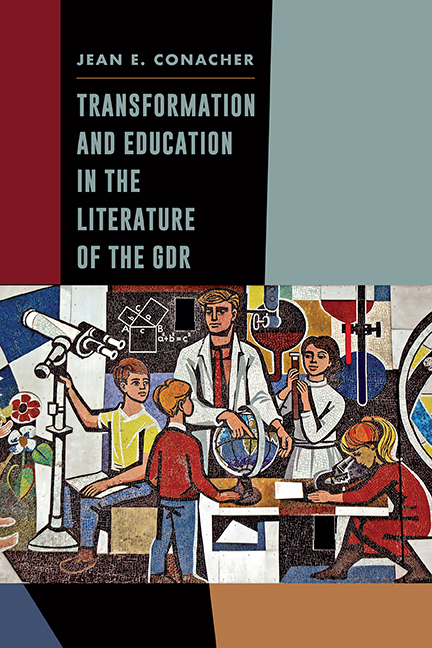Book contents
- Frontmatter
- Dedication
- Contents
- List of Illustrations
- Acknowledgments
- List of Abbreviations
- Introduction: The Postwar Desire for Renewal
- 1 Shaping the Cultural and Educational Landscape in the Soviet Occupation Zone (SBZ)
- 2 Interweaving GDR Education and Cultural Policy toward a National Literature
- 3 Critiquing the Norm in Steinmann' Die größere Liebe, Wolf' Der geteilte Himmel, and Kant' Die Aula
- 4 “Ich bin. Wer?“: Subjectivity and Transformation in Wolf' Nachdenken über Christa T. and Reimann' Franziska Linkerhand
- 5 “Wem geben wir Einsen … ?” Meritocracies and Reward in de Bruyn' Die Preisverleihung and Plenzdorf' Die neuen Leiden des jungen W.
- 6 “Mir geht es gut”: Challenging Stagnation in Hein' Der fremde Freund and H�ntsch' Wir sind keine Kinder mehr
- Conclusion
- Appendix A Text-Internal Functions of Narrative Triangle (Left Side)
- Appendix B Text-External Functions of Narrative Triangle (Right Side)
- Notes
- Bibliography
- Index
- Frontmatter
- Dedication
- Contents
- List of Illustrations
- Acknowledgments
- List of Abbreviations
- Introduction: The Postwar Desire for Renewal
- 1 Shaping the Cultural and Educational Landscape in the Soviet Occupation Zone (SBZ)
- 2 Interweaving GDR Education and Cultural Policy toward a National Literature
- 3 Critiquing the Norm in Steinmann' Die größere Liebe, Wolf' Der geteilte Himmel, and Kant' Die Aula
- 4 “Ich bin. Wer?“: Subjectivity and Transformation in Wolf' Nachdenken über Christa T. and Reimann' Franziska Linkerhand
- 5 “Wem geben wir Einsen … ?” Meritocracies and Reward in de Bruyn' Die Preisverleihung and Plenzdorf' Die neuen Leiden des jungen W.
- 6 “Mir geht es gut”: Challenging Stagnation in Hein' Der fremde Freund and H�ntsch' Wir sind keine Kinder mehr
- Conclusion
- Appendix A Text-Internal Functions of Narrative Triangle (Left Side)
- Appendix B Text-External Functions of Narrative Triangle (Right Side)
- Notes
- Bibliography
- Index
Summary
WITHIN HIS “Geschichten vom Herrn Keuner,” first published in the SBZ in 1948, Brecht describes Herr Keuner's chance meeting with an old acquaintance who, when greeting him with the formulaic “Sie haben sich gar nicht verändert,” is startled by his response: “‘Oh!’ sagte Herr K. und erbleichte.”1 This desire for constant individual transformation and the accompanying fear of personal stagnation lie at the heart of Marxist theories of human and societal development and underpin both educational and cultural policy decisions throughout the history of the GDR. From the chaotic days of the immediate postwar period to the turmoil of the Wende and ultimate reunification of Germany, GDR literature was marked by a concern to map and explore that transformation and to signal, not least through the portrayal of formal education processes, the underlying causes of the increasing stagnation that finally led people so dramatically out onto the streets in protest.
It is not surprising given the postwar emphasis on education and self-improvement, coupled with the belief that all societal and individual aspirations could finally be fulfilled, that writers drew on the Bildungsroman tradition for inspiration. In the event, the emergence of a socialist Bildungsroman in the 1950s proved a short-lived phenomenon, although this development remains a crucial reference point for any critical analysis of the portrayal of education and educational processes within literary works of the GDR. Given the nature of the interrelation between education and society, any study of transformational and educational processes leads naturally into an analysis of much broader societal issues. It remains surprising that sites and representatives of formal education have been broadly neglected by critics in the past, for each work considered here bears witness to the argument that education, as both a thematic and functional element, clearly pervaded GDR literature. Indeed, the educational process is often seen to be the central propelling force behind the action.
- Type
- Chapter
- Information
- Transformation and Education in the Literature of the GDR , pp. 207 - 225Publisher: Boydell & BrewerPrint publication year: 2020



